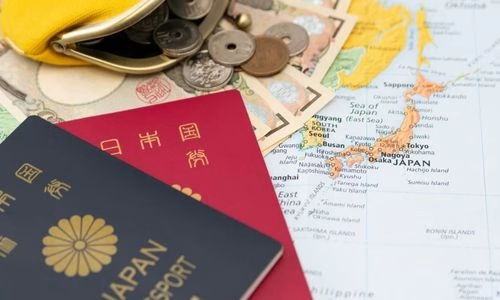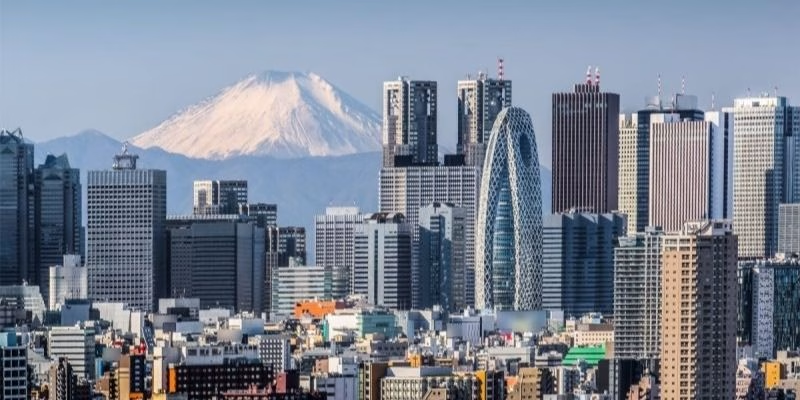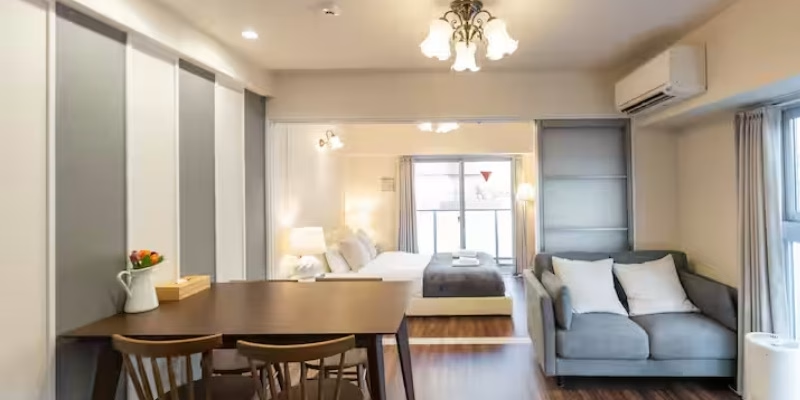Thinking of moving to Japan from the USA? Whether you’re drawn by Japan’s rich culture, high standard of living, or career opportunities, relocating across the Pacific is a life-changing decision. This guide breaks down everything you need to know, from visa options and apartment types to salary expectations and the cost of living.
Why More Americans Are Calling Japan Their New Home
Japan remains a top destination for American expats seeking a fresh start abroad, thanks to its clean and safe cities, world-class public transit, and highly efficient healthcare system. Beyond the appeal of its rich culture and exceptional quality of life, Japan offers a lifestyle that blends modern convenience with deep-rooted traditions, something that continues to captivate newcomers year after year.
Tokyo, the nation’s capital, stands out as a global city full of energy, opportunity, and excitement. It’s perfect for those drawn to fast-paced city living, with endless access to dining, nightlife, career opportunities, and entertainment. However, if you’re someone who prefers a quieter environment without sacrificing convenience, relocating to the Tokyo suburbs can be a smart move.
Suburban neighborhoods such as Chofu, Koganei, and Setagaya offer a more peaceful, residential feel while still providing easy train access to central Tokyo. These areas are known for their leafy streets, spacious parks, and a more laid-back pace of life. They’re especially attractive for families or individuals who value green spaces and more affordable housing compared to central wards like Shibuya or Minato.
Choosing a suburban location also opens up better options for renting a larger typical Tokyo apartment or even exploring Tokyo flats for sale at a more reasonable price point. Whether you’re relocating solo or with family, these quieter districts deliver both comfort and convenience, making them ideal for American expats who want the best of both worlds.

Modern Comfort Beyond City Rush
From Arrival to Long-Term Stay: Navigating Japan’s Visa Rules
If you’re planning to move to Tokyo from the United States and rent your own apartment, the very first step is to secure a valid Japanese visa. Without it, you won’t be able to sign a lease, register your address at the city office, or access essential services like utilities, bank accounts, or mobile phone contracts.
There are several visa types available for U.S. citizens, depending on your purpose for living in Japan. Below are the key options you’ll likely come across:
Work Visa
This is the most typical route for Americans moving to Japan for employment. The work visa covers various professional fields such as IT, engineering, finance, marketing, and education. Teaching English remains one of the most popular jobs among expats, especially for first-time residents. If you’re hired by a Japanese company or international school, your employer will act as your visa sponsor and help you obtain the necessary Certificate of Eligibility (COE). This visa allows you to work full-time and rent an apartment legally in Japan.

From Job Offer to Japan Life
Student Visa
Planning to attend a Japanese university or a full-time Japanese language school? So, your next step would be securing a student visa. This visa permits long-term stay and is suitable for anyone pursuing higher education or language study. Many international students choose this path to improve their Japanese proficiency while adjusting to life in Tokyo. Student visa holders are often allowed to work part-time (up to 28 hours a week), which can help cover Tokyo renting apartment costs and daily expenses.

Student Life Starts with a Visa
Spouse or Dependent Visa
If you have a spouse, partner, or parent who already lives in Japan under a valid visa, you may qualify for a spouse or dependent visa. This visa is ideal for joining family members and usually allows you to stay for the same duration as the main visa holder. In some cases, you may also receive permission to work part-time. It’s a great option for family reunification, especially for couples where one partner already has a full-time job in Japan.

Visa Support for Loved Ones
Work in Japan as a Highly Qualified Specialist
For individuals with advanced qualifications, higher education, and strong professional backgrounds, Japan offers a fast-track immigration route through the Priority visa for workers with outstanding abilities. This category rewards applicants with higher salaries, work experience, and Japanese language skills. If you meet the criteria, you can benefit from faster approval times, a five-year visa, and even eligibility for permanent residency in as little as one year. This visa is particularly useful if you’re seeking upper middle class salary in Japan opportunities and looking to rent higher-end properties or even explore Tokyo flats for sale.

Fast-Track Visa for Top Talent
Most Visas Require a Sponsor
Keep in mind that nearly all visa types require sponsorship. This sponsor is typically your employer (for work visas), your school (for student visas), or a family member (for dependent visas). You’ll need to submit documentation from your sponsor as part of your visa application. Therefore, it’s important to secure a job offer or admission letter before applying.
Once your visa is approved, you’ll receive a residence card (在留カード) at the airport upon arrival. This card is essential for every aspect of daily life in Japan, including renting an apartment in Tokyo.

Visa Sponsorship Is a Must
How does the typical paycheck look in Japan?
If you’re planning to move or work in Japan, understanding the country’s salary benchmarks can help you budget smarter. So, what is the average salary in Japan in 2025? Here’s what to expect:
- What’s the typical monthly income in Japan? The typical monthly salary is around ¥460,000, which is about $3,200 USD depending on the exchange rate.
- What is the average wage in Japan annually? For full-time employees, the average pay ranges between ¥5 million and ¥5.5 million per year.
- What is the median income in Japan? The median figure sits at roughly ¥4.5 million annually, meaning half the population earns less and half earns more.
- What is the average Japanese salary by industry? Salaries vary, but most jobs fall between ¥4 million and ¥6 million annually, especially in sectors like manufacturing, IT, and education.
For those relocating to the capital, it’s worth noting that Tokyo’s median salary is slightly above the national average, around ¥6 million per year. Meanwhile, the Tokyo median household income in 2025 is estimated at approximately ¥8.5 million, reflecting higher living standards and dual-income families.
Types of Apartments in Japan
When you start apartment hunting in Japan, especially in Tokyo, you’ll quickly come across abbreviations like 1K, 1DK, or 2LDK. These codes describe the layout of Japanese apartments and can greatly affect both your comfort and your rent.
- How is a 1K apartment defined in Japan? A 1K is a one-room unit with a separate kitchen, usually compact and popular among solo renters or students.
- 1DK: One room plus a dining/kitchen area, slightly larger and better for those who cook often or want more space to eat.
- 2LDK: Two separate rooms, plus a living room, dining area, and kitchen, ideal for couples, small families, or roommates.
These types of apartments in Japan range in size depending on location and layout. A typical Tokyo apartment falls between 20m² to 60m², with smaller units dominating the city center. If you’re looking to live downtown, expect rent to start around ¥100,000/month for a basic studio.
For those on a tighter budget or who want more living space, the Tokyo suburbs offer better value. Neighborhoods just outside the city, like Setagaya, Chofu, or Koganei, often feature larger floor plans, lower monthly rent, and quiet surroundings. These areas are especially popular with families, pet owners, or anyone working within the Tokyo median income range.
Whether you’re earning a typical Japanese salary or looking for a balance between price and quality of life, understanding these apartment types helps you make the best housing choice.
Tokyo Housing: What to Expect When Renting
Finding a place to live in Tokyo can be a quick-moving process, especially in high-demand neighborhoods. Be ready for initial costs, which often include:
- Key money (礼金): A non-refundable gift to the landlord
- Deposit (shikikin): Typically equal to 1–2 months’ rent
- Real estate agency fee: Usually one month’s rent
- Guarantor-related fees: May apply if you don’t have a local co-signer
To ease your Tokyo apartment search, start with trusted Japanese platforms like Suumo and Homes, or work with English-speaking agents such as Arealty for better communication and guidance.
If you’re planning a long stay, consider looking into Tokyo flats for sale. A small 1LDK unit in suburban areas usually begins at ¥50 million, depending on the location and building condition.
Lifestyle, Cost of Living
Living in Japan means embracing a new culture and learning the local social customs. The healthcare system is accessible and reasonably priced, allowing residents to receive quality medical care without excessive expenses. Transportation across cities and regions is highly efficient and punctual, making daily commuting or traveling convenient and stress-free. Japan is also known for its exceptional public safety, providing a secure environment for everyone. Nevertheless, managing your budget carefully remains essential to maintain a comfortable lifestyle.
For those earning an average Japanese salary, life can be quite comfortable, especially if you choose to reside in suburban or less expensive areas outside major city centers. These locations often offer a good balance between affordability and quality of life. On the other hand, individuals with upper-middle-class incomes in Japan tend to enjoy even greater flexibility. They can afford larger or more modern housing options, access a wider range of leisure activities, and generally experience a more comfortable and versatile lifestyle.

Balance Lifestyle and Cost in Japan
Conclusion
Moving to Japan from the USA is a thrilling and rewarding experience when approached with proper preparation. It’s important to understand your visa options, get familiar with wage levels in Japan, and explore housing choices well in advance. Whether you’re planning to earn the Tokyo median income in 2025 or aiming for a higher salary bracket, success begins with careful planning and informed decisions.
Using trusted resources like Arealty.jp can make your transition smoother, helping you find the best apartments and navigate the rental process with ease. With this guide and support from Arealty, you’re one step closer to building a fulfilling and comfortable life in Japan.






Leave a Reply